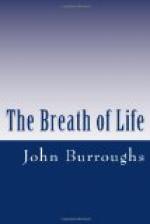The rigidly scientific mind, impressed with all these things as the lay mind cannot be, used to the searching laboratory methods, and familiar with the phenomenon of life in its very roots, as it were, dealing with the wonders of chemical compounds, and the forces that lurk in molecules and atoms, seeing in the cosmic universe, and in the evolution of the earth, only the operation of mechanical and chemical principles; seeing the irrefragable law of the correlation and the conservation of forces; tracing consciousness and all our changes in mental states to changes in the brain substance; drilled in methods of proof by experimentation; knowing that the same number of ultimate atoms may be so combined or married as to produce compounds that differ as radically as alcohol and ether,—conversant with all these things, and more, I say,—the strictly scientific mind falls naturally and inevitably into the mechanistic conception of all life phenomena.
Science traces the chain of cause and effect everywhere and finds no break. It follows down animal life till it merges in the vegetable, though it cannot put its finger or its microscope on the point where one ends and the other begins. It finds forms that partake of the characteristics of both. It is reasonable to expect that the vegetable merges into the mineral by the same insensible degrees, and that the one becomes the other without any real discontinuity. The change, if we may call it such, probably takes place in the interior world of matter among the primordial atoms, where only the imagination can penetrate. In that sleep of the ultimate corpuscle, what dreams may come, what miracles may be wrought, what transformations take place! When I try to think of life as a mode of motion in matter, I seem to see the particles in a mystic dance, a whirling maze of motions, the infinitely little people taking hold of hands, changing partners, facing this way and that, doing all sorts of impossible things, like jumping down one another’s throats, or occupying one another’s bodies, thrilled and vibrating at an inconceivable rate.
The theological solution of this problem of life fails more and more to satisfy thinking men of to-day. Living things are natural phenomena, and we feel that they must in some way be an outcome of the natural order. Science is more and more familiarizing our minds with the idea that the universe is a universe, a oneness; that its laws are continuous. We follow the chemistry of it to the farthest stars and there is no serious break or exception; it is all of one stuff. We follow the mechanics of it into the same abysmal depths, and there are no breaks or exceptions. The biology of it we cannot follow beyond our own little corner of the universe; indeed, we have no proof that there is any biology anywhere else. But if there is, it must be similar to our own. There is only one kind of electricity (though two phases of it), only one kind of light and heat, one kind of chemical




